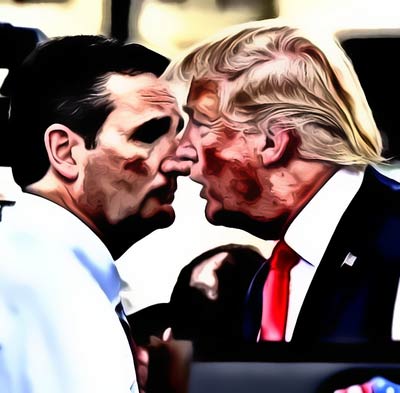
The biggest fuss in Republican presidential politics now seems to be why, or perhaps whether, some party actors have concluded that even though billionaire Donald Trump would be a bad nominee, he's still better than Texas Sen. Ted Cruz.
The group we're talking about here is a subset of the Republican Party. Of the politicians, campaign and governing professionals, donors and activists, formal party officials and staff, and party-aligned media and interest groups that make up the party, this subset appears to some combination of those who have long opposed Tea Party and other insurgent candidates, and of Washington-based influencers.
Here are some theories about what they are up to and what it means.
Perhaps it's personal. Republican party actors -- his fellow senators in particular -- just really hate Cruz, and can't see past that.
Perhaps the opposition is tactical: These party actors figure the best bet to defeat both unwanted candidates is to stop Cruz in Iowa, which would set up a one-on-one contest between Trump and some other candidate they can live with. Statistician Nate Silver notes that it's a tricky strategy; what if Trump wins Iowa and then never stops winning?
Perhaps this reflects an unsentimental but straightforward desire by some Washington Republicans to keep their piece of the Washington pie. The New Republic's Jeet Heer put it this way: "Unlike Cruz, Trump has no army of ideological loyalists working with him. President Trump would need advisers and policymakers, which the Republican Party could happily provide him."
If that's what they're thinking, there's a good chance they're dead wrong. Cruz might freeze out some traditional Republicans, but ultimately he gives every indication of wanting to enact conservative policies, and that would mean establishing decent relationships with the rest of the Republican Party.
As for Trump? He's entirely unpredictable. Sure, he would have to hire people, but why would he turn to the usual suspects? It's not as if he has a predictably conservative agenda. Trump hasn't relied on Republican campaign professionals so far; there's no reason to assume he would hire Republican governing professionals if he won.
Perhaps many Republicans simply can't see past Trump's money. Jonathan Martin at the New York Times considers the possibility that some like Trump because he's a "wealthy businessman" which makes him "a recognizable type in the political world." That may work on two levels: an assumption that his campaign is just window dressing and that if elected he would be a reliable voice for Republican interests, or at least business interests; and, maybe more important, a core belief that rich businessmen are just better than anyone else, so it would all work out.
One more possibility. Perhaps the "live with Trump" impulse is less than it seems. Former Kansas Sen. Bob Dole, whose comment that he preferred Trump to Cruz drew much attention, was a great Republican leader, but he hasn't been an active force in the party for 20 years. With some exceptions, such as Iowa Gov. Terry Branstad, most of the anti-Cruz fervor seems to be coming from people who have worked with him, which mostly means those in Washington. Party actors elsewhere are much more likely to support Cruz (he has only a handful of congressional endorsements but plenty of state legislators in his camp).
The arm's-length embrace of Trump by some elite Republicans this week reminded me of the way Democratic party actors put on a show of accepting civil rights activist Jesse Jackson late in the 1988 nomination battle. It signaled that Jackson had done enough to deserve a certain level of respect from the party. He may simply have put together enough support that the party needed to keep him happy through the fall campaign. And it's not yet clear whether any Republican party actors are warming to Trump now.
What is clear is that at least for now, Republicans party actors have collectively failed to choose any of the remaining mainstream conservatives -- Florida Sen. Marco Rubio, former Florida Gov. Jeb Bush, New Jersey Gov. Chris Christie or Ohio Gov. John Kasich -- who would seem to offer an excellent chance of winning the nomination if only party actors could signal to mainstream conservative voters that one of them is the horse to back. It's not too late, but time is beginning to run out.
Comment by clicking here.
Jonathan Bernstein, a politicial scientist and author, is a Bloomberg View columnist.



 Contact The Editor
Contact The Editor
 Articles By This Author
Articles By This Author